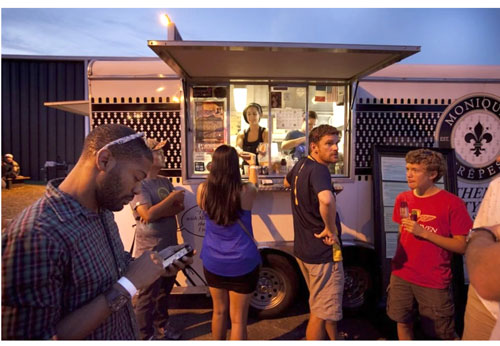Why your home owners association might want to get into the food truck business
The Washington Post
By Jill Chodorov Kaminsky
08 January 2018

Timothy C. Wright for The Washington Post
Food trucks do more than provide creative alternatives to the same old
lunch and dinner options. They bring neighbors together.
People at condominium and single-family-home communities are learning
the financial and social benefits of coordinating activities, such as
food truck events or book clubs. If you like where you live, you
typically stay longer and complain less.
“Residents are happier when they feel like the property they call home
really cares about them,” said Chan Frazier, founder of Socially
Directed, a resident retention consulting firm based in
Washington. “You can ride in an elevator and never speak with
your neighbor, but if you see them at a happy hour you might talk.”
Frazier says his mission is to help community managers achieve high resident retention by coordinating social events.
“Many new construction buildings in the greater D.C. region were
designed for live, work and play, yet they have never organized events
utilizing these spaces,” Frazier said. “We are helping building
managers do something with those spaces.”
Community events are not a new phenomenon.
Senior living communities have been providing activities for residents
for decades. I can’t keep up with my own mother’s social calendar of
attending shows, book talks and pool parties as a resident at Leisure
World in Silver Spring. And don’t forget about the weekly
Mah-jongg game. Who knew mom was a trend-setter.
At my own Washington condominium, a local food truck is scheduled to pull up in front of the building one evening each week.
“We have a wide variety of food trucks that sell approximately 100
meals in the three hours they are at the building,” said Margie
Nichols, on-site building manager at the Connecticut condominium,
3883 Connecticut Ave. NW. “Currently, we are booked [to the end
of] January with a waiting list of truck owners that want to come to
3883.”
The popularity of the food truck at my building has grown quickly.
“This started out as a monthly event,” Nichols said. “Considering its success, we decided to provide it weekly.”
Nichols said that building events help residents participate in and gain a sense of community.
I have met many of my neighbors at the food truck that I may not have
met otherwise. A regular topic of discussion is what’s on the
menu and what’s the name of our dogs.
Not all buildings outsource the coordination of community events or
leave the task to building managers. Some residents take on the
responsibility themselves to improve their own living environment.
The Connecticut’s resident social committee coordinates a game night, craft night and a book club.
Sumner Village, a development of 16 low-rise condominium buildings in
Bethesda, has an active and endless list of events coordinated by a
volunteer resident activities chair. Each season highlights
indoor or outdoor activities, depending upon the weather.
“The summer brings well-attended water aerobics classes in our outdoor
pool,” Jane Stanton, the current activities coordinator at Sumner
Village, said in a recent email. “February showcases ‘The Salon’
in which residents show off their various talents.”
Not everyone is interested in participating, however.
“Some commuters are only here a few days a week for work and then
return to New York, Richmond, Baltimore or wherever they live
full-time,” Frazier said. “And some just don’t want to be social.”
Even if you don’t want to know your neighbors, living in a neighborhood
with a strong sense of community creates a more enjoyable experience at
the end of the day.
top contents
appendix
previous next
